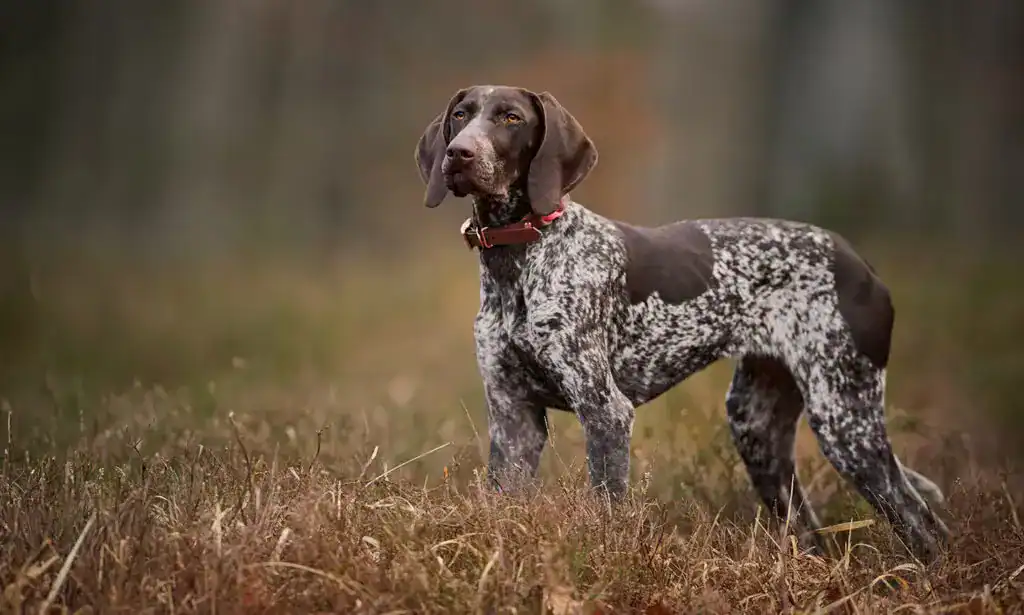Table of Contents
🐕🦺 German Shorthaired Pointer Dog: History, Characteristics
The German Shorthaired Pointer (GSP) is a versatile and energetic dog breed that has captured the hearts of many dog enthusiasts. Known for its athleticism, intelligence, and affectionate nature, this breed is popular among hunters, active families, and anyone who appreciates a loyal canine companion. Whether you’re looking for a hardworking hunting partner or a loving family pet, the German Shorthaired Pointer has much to offer.
📜 Short History
The German Shorthaired Pointer has a rich history that dates back to the 19th century in Germany. Developed by crossing various breeds, including the Old Spanish Pointer, the English Pointer, and local German tracking dogs, the GSP was designed to be an all-purpose hunting dog. The breed’s versatility was paramount; it was expected to track, point, retrieve, and even hunt game on both land and water.
The breed was officially recognized in Germany in the late 1800s and quickly gained popularity due to its exceptional hunting abilities. The GSP made its way to the United States in the early 20th century, where it was recognized by the American Kennel Club (AKC) in 1930. Since then, the breed has grown in popularity, not only as a hunting dog but also as a beloved family pet.
📌 Quick Facts & Essential Details

| Category | Details |
|---|---|
| 🏷 Breed Name | German Shorthaired Pointer |
| 📛 Other Names | GSP, Deutsch Kurzhaar |
| 📍 Origin | Germany |
| 🏆 Recognized By | AKC, UKC, FCI, CKC |
| 🔢 Size Variants | Medium to large-sized sporting dog |
| ⚖ Weight Range | 45 – 70 lbs (20 – 32 kg) |
| 📏 Height Range | 21 – 25 inches (53 – 64 cm) |
| ⏳ Lifespan | 12 – 14 years |
🐕🦺 Coat & Appearance
| Category | Details |
|---|---|
| 🧥 Coat Type | Short, dense, water-resistant |
| 🎨 Coat Colors | Liver, liver & white, liver roan, spotted, ticked |
⚡ Energy & Personality

| Category | Details |
|---|---|
| 🔋 Energy Level | Very high |
| 🏅 Breed Group | Sporting Group |
| 🧠 Temperament | Intelligent, affectionate, friendly, eager to please |
| 🏠 Apartment-Friendly? | Not ideal—needs space to run |
| 🎓 Trainability | Very high—quick learners, love training |
🩺 Health & Care Needs

| Category | Details |
|---|---|
| ⚕ Common Health Issues | Hip dysplasia, bloat, heart disease, eye issues |
| ✂ Grooming Needs | Low—occasional brushing needed |
| 🍂 Shedding Level | Moderate—year-round shedding |
| 🏃 Exercise Needs | Extremely high—requires daily intense activity |
❤️ Suitability & Compatibility

| Category | Details |
|---|---|
| 🏡 Best For | Active families, hunters, outdoor enthusiasts |
| 🚫 Not Ideal For | Apartment dwellers, low-activity owners |
| 🔊 Barking Level | Moderate—alert but not excessive |
| 👶 Good With Kids? | Yes, excellent with children |
| 🐾 Good With Pets? | Yes, but may chase small animals |
| 👩🏫 First-Time Owner Friendly? | Yes, with proper training |
| ☀️ Weather Tolerance | Tolerates both hot and cold, but prefers moderate climates |
🎉 Fun & Extra Info
| Category | Details |
|---|---|
| 🌟 Famous Dogs of This Breed | ‘CJ’ (2016 Westminster Best in Show winner) |
| 🧠 Intelligence Level | Very high—ranks among the smartest breeds |
| ⚠ Common Behavioral Issues | Hyperactivity, separation anxiety, destructive chewing if bored |
| 🥘 Best Diet | High-protein diet for active dogs |
| ❌ Foods to Avoid | Chocolate, grapes, onions, fatty foods |
| 🤩 Fun Fact | They are known for their versatile hunting skills—pointing, flushing, and retrieving! |
| 💰 Price of Puppy | $800 – $2,500 |
✅ Final Thoughts
The German Shorthaired Pointer is a high-energy, intelligent, and versatile dog, perfect for active owners who love outdoor adventures. With their loving personality, excellent trainability, and strong hunting instincts, they make amazing companions for those who can keep up with their exercise needs. If you’re looking for a loyal, athletic, and fun-loving dog, the GSP is a perfect choice! 🏡🐾💖
📊 Comparison of Similar Dog Breeds
🐶 German Shorthaired Pointer vs. Vizsla 🎯🏆


| Feature 🏆 | German Shorthaired Pointer (GSP) 🇩🇪 | Vizsla 🇭🇺 |
|---|---|---|
| 📍 Origin | Germany | Hungary |
| 🏅 Recognized By | AKC, FCI, UKC | AKC, FCI, UKC |
| 📏 Size Variants | Medium to Large | Medium |
| ⚖️ Weight Range | 45-70 lbs (20-32 kg) | 45-65 lbs (20-29 kg) |
| 📏 Height Range | 21-25 inches (53-64 cm) | 21-24 inches (53-61 cm) |
| ⏳ Lifespan | 10-14 years | 12-15 years |
| 🐶 Coat Type | Short, sleek, dense | Short, smooth, close-fitting |
| 🎨 Coat Colors | Liver, liver & white, ticked, patched, roan | Solid golden rust |
| ⚡ Energy Level | Very High | Very High |
| 🏡 Breed Group | Sporting Group | Sporting Group |
| 🔊 Barking Level | Moderate | Low to Moderate |
| 👶 Good With Kids? | Yes, affectionate & playful | Yes, very gentle & affectionate |
| 🐕 Good With Pets? | Yes, but has a strong prey drive | Yes, friendly but high energy |
| 🧠 Intelligence Level | Very High (Quick Learner & Versatile) | Very High (Highly Trainable & Loyal) |
| ⚠️ Common Behavioral Issues | Can be stubborn, needs exercise & training | Prone to separation anxiety, needs mental stimulation |
| 💰 Price of Puppy | $800 – $2,500 | $1,500 – $3,500 |
| Overall Rating | ⭐⭐⭐⭐⭐ (Athletic & Trainable) | ⭐⭐⭐⭐⭐ (Affectionate & Agile) |
Conclusion
The German Shorthaired Pointer is a remarkable breed, combining intelligence, athleticism, and affection into a versatile and loyal companion. Whether you’re an avid hunter, a runner, or simply someone who loves the outdoors, the GSP might be the perfect addition to your family. With the right care, training, and attention, this breed will reward you with years of companionship, love, and adventure.
FAQs
Is the German Shorthaired Pointer a dangerous dog?
No, the German Shorthaired Pointer is not considered a dangerous dog. They are known for their friendly and outgoing nature. While they may have strong hunting instincts, they are typically gentle and affectionate with people, including children. Proper socialization and training will ensure they are well behaved and safe companions.
Is the German Shorthaired Pointer the best guard dog to protect you or your family?
While the German Shorthaired Pointer is alert and will bark to alert you to strangers, they are not typically used as guard dogs. Their friendly and social nature makes them more likely to welcome guests rather than act as protectors. However, their loyalty and intelligence mean they can be trained to be more protective if needed, though they are not naturally aggressive.


